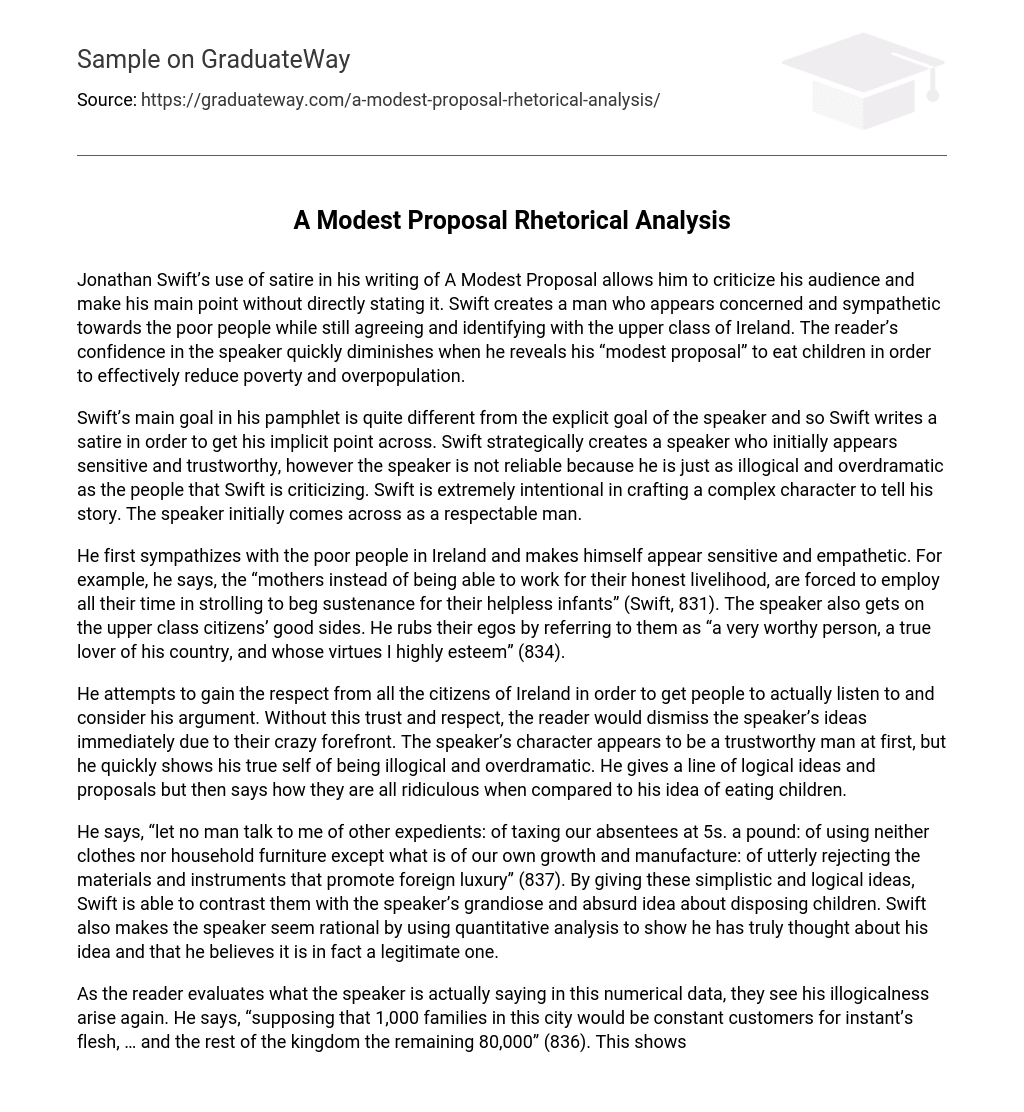Jonathan Swift uses satire in A Modest Proposal to critique his audience and convey his main point indirectly. Through the creation of a seemingly sympathetic character who aligns himself with both the poor and the upper class of Ireland, Swift undermines the reader’s trust in the speaker. This trust is shattered when the speaker unveils his “modest proposal” to eradicate poverty and overpopulation by consuming children.
Swift uses satire in his pamphlet to subtly convey his main goal, which is different from the explicit goal of the speaker. The speaker, initially seeming sensitive and trustworthy, is not reliable as he exhibits the same illogical and overdramatic behavior as the people Swift is criticizing. Swift meticulously constructs a complex character to effectively convey his message, with the speaker initially appearing respectable.
The speaker begins by expressing sympathy for the impoverished individuals in Ireland, projecting an image of being understanding and compassionate. As an illustration, he mentions how the mothers are compelled to devote their entire time to begging for their vulnerable infants’ sustenance (Swift, 831). Additionally, the speaker positively addresses the upper-class members of society, boosting their ego by describing them as “a very worthy person, a true lover of his country, and whose virtues I highly esteem” (834).
In his attempt to gain respect from the citizens of Ireland, the speaker aims to capture their attention and consideration for his argument. Without this trust and respect, the readers would quickly dismiss his ideas as absurd. Initially appearing as a trustworthy individual, the speaker soon reveals his illogical and overly dramatic nature. While initially presenting logical ideas and proposals, he ultimately undermines them by suggesting the outrageous notion of eating children.
In this passage, Swift presents a speaker who dismisses other suggestions such as taxing absentees, utilizing only locally made clothes and furniture, and rejecting extravagant foreign goods. These straightforward and reasonable ideas are juxtaposed with the speaker’s extravagant and illogical proposal to dispose of children. By employing quantitative analysis, Swift portrays the speaker as thoughtful and convinced of the validity of his idea.
As the reader evaluates the speaker’s numerical data, they perceive his illogicalness resurfacing. He states, “supposing that 1,000 families in this city would be constant customers for instant’s flesh, … and the rest of the kingdom the remaining 80,000” (836). This indicates that only a small fraction of the population, one eightieth to be exact, would benefit from the proposed solution. This outcome does not effectively address the needs of the majority nor does it suggest widespread popularity. A rational proposition to benefit the country would need to consider both the positives and negatives for all citizens.
The speaker designed by Swift is illogical but also displays his penchant for the overdramatic through his absurd ideas. A prime example is his proposition of consuming infants. The average person would never entertain, let alone endorse, such a notion of devouring one’s own or another’s offspring. Additionally, the speaker amplifies his dramatic persona by drawing parallels between his proposal and the concept of involuntary abortion, suggesting that consuming children would spare impoverished individuals from the stigma associated with terminating a pregnancy.
According to the speaker, his reluctance to have an abortion is driven more by the cost than the shame it would evoke, which could potentially elicit sympathy even from the cruelest individuals. This comparison between abortion and consuming children is an attempt to justify his viewpoint. However, the speaker’s exaggerated statements and lack of logical reasoning make him an unreliable advocate. In order to gain acceptance from a influential group, he attempts to portray himself as an educated member of the higher social class.
The speaker, created by Swift, refers to the “famous Psalmanazar a native of the Island Famosa” in order to appear knowledgeable and important to the upper class audience (835). By using the words “we” and “they” frequently, Swift creates a divide between the speaker and the lower class, establishing a sense of unity with the elite. This helps to build trust and credibility with the upper class audience. The speaker effectively portrays himself as part of the upper class or at least familiar with their ways, enabling him to convey his true opinions on the situation in Ireland. Swift presents this character as irrational, exaggerated, and similar to the wealthy class, implying that the upper class individuals are also irrational and exaggerated. Through this depiction, Swift conveys his belief in the absurdity of the upper class and specifically their proposals.
Upon examining the speaker’s statements, it becomes apparent that Swift’s opinions are validated. Both he and the people of Ireland consider their ideas to be “obvious” and of the utmost significance. However, the mere suggestion of consuming children highlights the severe flaws in the speaker and the upper class individuals who entertain such an idea. By dissecting the speaker’s words, one can perceive Swift’s primary objective in penning this pamphlet and comprehend why he opted for satire as a means of communication.
In order for criticism towards the upper class to be impactful, it cannot simply state their faults. It is common knowledge that poverty and famine exist, but the root of the problem must be addressed. Swift accomplishes this by ingeniously constructing the concept of “A Modest Proposal” and developing the character of the speaker who presents this proposal. Through juxtaposing the speaker and the group he aspires to join with the upper class of Ireland, Swift reveals their striking similarities in their selfish intentions and behaviors.
The speaker, who is not trustworthy despite his attempts to present himself as such, shares similarities with other men who propose similar extravagant ideas. Swift’s use of satire throughout the entire pamphlet helps readers grasp his true criticism: that the upper class individuals and the Irish government’s proposals are as illogical as Swift’s suggestion of consuming children.





